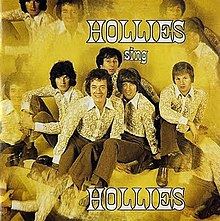| Hollies Sing Hollies | ||||
|---|---|---|---|---|
 | ||||
| Studio album by | ||||
| Released | November 1969 | |||
| Recorded | 23 June–10 October 1969 [1] | |||
| Studio | EMI Studios, London | |||
| Genre | Rock, pop | |||
| Length | 38:19 | |||
| Label | UK: Parlophone PCS 7092 | |||
| Producer | Ron Richards | |||
| The Hollies chronology | ||||
| ||||
| Review scores | |
|---|---|
| Source | Rating |
| Allmusic - | |
| Allmusic - | |
Hollies Sing Hollies is the ninth studio album released in the UK by the Hollies. It was released in November 1969 by Parlophone. It was their second album that year, coming 6 months after an entire album of Bob Dylan covers. It was their first album of original compositions since the departure of Graham Nash. It was also the second album by the Hollies to feature Terry Sylvester and the first to feature his compositions, as well as an instrumental by bassist Bernie Calvert. The US version, titled "He Ain't Heavy, He's My Brother" (with a different cover photo), included the hit single of the same name, while omitting the tracks "Soldier's Dilemma" and "Marigold/Gloria Swansong". The UK album did not chart, but its US version peaked at number 32.
